Antibody data
- Antibody Data
- Antigen structure
- References [1]
- Comments [0]
- Validations
- Immunohistochemistry [2]
- Flow cytometry [2]
- Other assay [5]
Submit
Validation data
Reference
Comment
Report error
- Product number
- MA5-15912 - Provider product page

- Provider
- Invitrogen Antibodies
- Product name
- KID Monoclonal Antibody (1E3)
- Antibody type
- Monoclonal
- Antigen
- Purifed from natural sources
- Description
- MA5-15912 targets KID in indirect ELISA, FACS, IHC, and WB applications and shows reactivity with Human samples. The MA5-15912 immunogen is purified recombinant fragment of human KID expressed in E. Coli. . MA5-15912 detects KID which has a predicted molecular weight of approximately 73kDa.
- Reactivity
- Human, Mouse
- Host
- Mouse
- Isotype
- IgG
- Antibody clone number
- 1E3
- Vial size
- 100 μL
- Concentration
- Conc. Not Determined
- Storage
- Store at 4°C short term. For long term storage, store at -20°C, avoiding freeze/thaw cycles.
Submitted references KIF22 promotes bladder cancer progression by activating the expression of CDCA3.
Li K, Li S, Tang S, Zhang M, Ma Z, Wang Q, Chen F
International journal of molecular medicine 2021 Dec;48(6)
International journal of molecular medicine 2021 Dec;48(6)
No comments: Submit comment
Supportive validation
- Submitted by
- Invitrogen Antibodies (provider)
- Main image
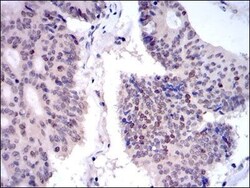
- Experimental details
- Immunohistochemical analysis of paraffin-embedded colon cancer tissues using kid monoclonal antibody (Product # MA5-15912) followed with DAB staining.
- Submitted by
- Invitrogen Antibodies (provider)
- Main image
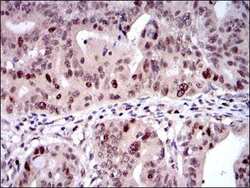
- Experimental details
- Immunohistochemical analysis of paraffin-embedded rectum cancer tissues using kid monoclonal antibody (Product # MA5-15912) followed with DAB staining.
Supportive validation
- Submitted by
- Invitrogen Antibodies (provider)
- Main image
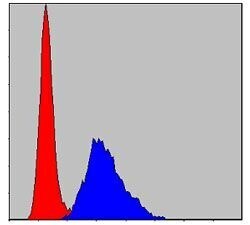
- Experimental details
- Flow cytometric analysis of NIH/3T3 cells using kid monoclonal antibody (Product # MA5-15912) (blue) and negative control (red).
- Submitted by
- Invitrogen Antibodies (provider)
- Main image
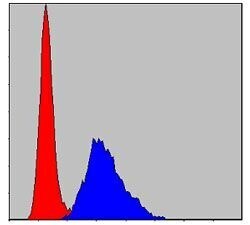
- Experimental details
- Flow cytometric analysis of NIH/3T3 cells using kid monoclonal antibody (Product # MA5-15912) (blue) and negative control (red).
Supportive validation
- Submitted by
- Invitrogen Antibodies (provider)
- Main image
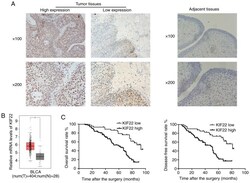
- Experimental details
- Figure 1 KIF22 is associated with the prognosis of patients with bladder cancer. (A) Left panel, representative images of KIF22 expression detected by immunohistochemistry in bladder cancer tissues (x100 and x200 magnification). Right panel, immunohistochemical staining of KIF22 protein in normal adjacent tissues (x100 and x200 magnification). (B) Bioinformatics data revealed that KIF22 was highly expressed in human bladder cancer tissues. (C) Kaplan-Meier analysis of the overall survival and disease-free survival rate between the KIF22 low and high expression groups. KIF22, kinesin family member 22.
- Submitted by
- Invitrogen Antibodies (provider)
- Main image
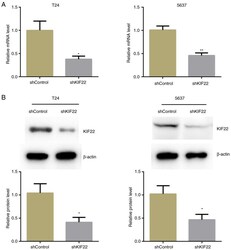
- Experimental details
- Figure 2 KIF22 expression is efficiently blocked by KIF22 shRNA in both T24 and 5637 cells. (A) Results of reverse transcription-quantitative PCR revealed that KIF22 expression was efficiently knocked down in T24 and 5637 cells caused by transfection with KIF22 shRNA plasmids. (B) Western blot analysis illustrating that KIF22 expression was markedly decreased in KIF22-shRNA transfected T24 and 5637 cells. The experiments were repeated three times. The results are presented as the mean +- SEM; * P
- Submitted by
- Invitrogen Antibodies (provider)
- Main image
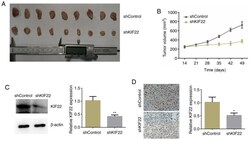
- Experimental details
- Figure 5 KIF22 promotes bladder tumor growth in mice. (A) Representative images of tumors in nude mice formed by T24 cells transfected with shControl and shKIF22 lentivirus (n=8 in each group). (B) Tumor volume was measured and growth curves are presented. (C) Western blot analysis revealed the expression of KIF22 in the control and KIF22-silenced tumor tissues. (D) Immunohistochemistry revealed the expression of KIF22 in the tumor tissues from mice injected with control and KIF22-silenced cells. The results are presented as the mean +- SEM; * P
- Submitted by
- Invitrogen Antibodies (provider)
- Main image
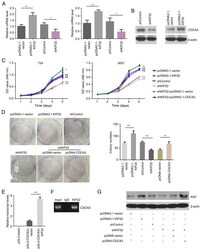
- Experimental details
- Figure 6 KIF22 transcriptionally activates the expression of CDCA3. (A) CDCA3 mRNA expression in the T24 (left panel) or 5637 (right panel) cells transfected with the pcDNA3.1-vector, pcDNA3.1-KIF22, control or KIF22 shRNA plasmids examined using reverse transcription-quantitative PCR. (B) CDCA3 expression in T24 cells transfected with pcDNA3.1-vector, pcDNA3.1-KIF22, control or KIF22 shRNA plasmids examined using western blot analysis. (C) CCK-8 assays exhibited the difference in the proliferation of the T24 (left panel) and 5637 (right panel) cells transfected with the indicated shRNAs and/or plasmids. (D) The effects of KIF22 on proliferation in T24 cells transfected the indicated shRNAs or plasmids were detected using colony formation assays, and the colony numbers were quantified. (E) Luciferase activity of pGL3-Basic, pGL3-CDCA3 in T24 cells co-transfected with pcDNA3.1-KIF22 or pcDNA3.1-vector plasmids examined using by dual-luciferase reporter assays. (F) PCR amplification of the anti-KIF22 antibody-enriched CDCA3 promoter fragment in T24 cells using ChIP assay. (G) Western blot analysis revealed the difference in Ki67 expression in the T24 (left panel) and 5637 (right panel) cells transfected with the indicated shRNAs and/or plasmids. The in vitro independent experiments were repeated three times. The results are presented as the mean +- SEM, * P
- Submitted by
- Invitrogen Antibodies (provider)
- Main image
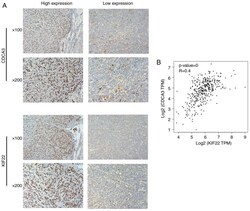
- Experimental details
- Figure 7 CDCA3 expression is positively associated with KIF22 expression in surgical bladder cancer tissues of patients. (A) Representative images of immunohistochemical staining of CDCA3 and KIF22 in bladder cancer tissues. (B) Pearson's correlation analysis of the significance between the expression of KIF22 and CDCA3 in human bladder cancer tissues. KIF22, kinesin family member 22; cell division cycle-associated protein 3.
 Explore
Explore Validate
Validate Learn
Learn Western blot
Western blot ELISA
ELISA Immunohistochemistry
Immunohistochemistry